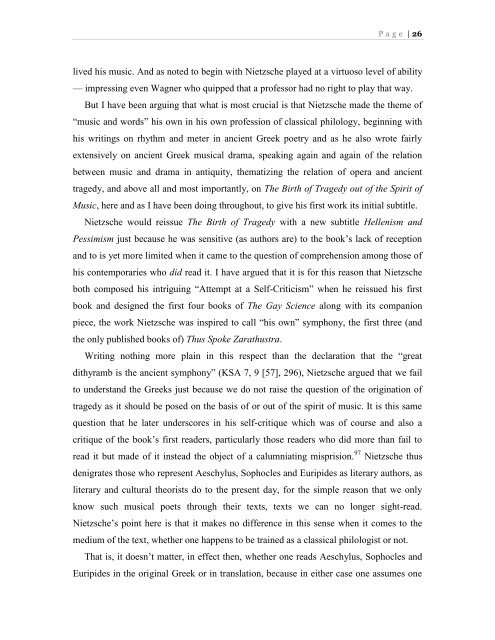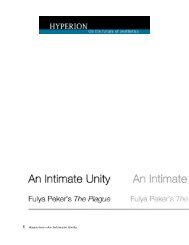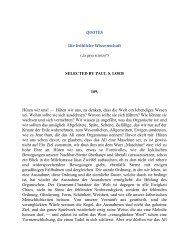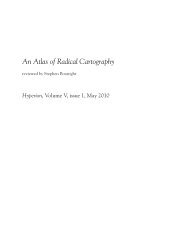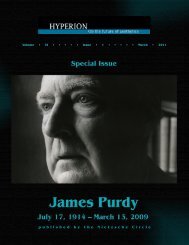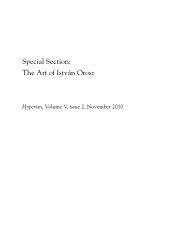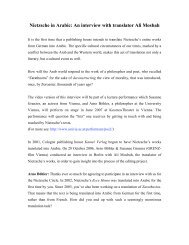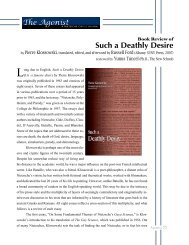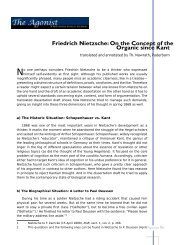Music, The Birth of Tragedy, and Nietzche's ... - Nietzsche Circle
Music, The Birth of Tragedy, and Nietzche's ... - Nietzsche Circle
Music, The Birth of Tragedy, and Nietzche's ... - Nietzsche Circle
You also want an ePaper? Increase the reach of your titles
YUMPU automatically turns print PDFs into web optimized ePapers that Google loves.
P a g e | 26<br />
lived his music. And as noted to begin with <strong>Nietzsche</strong> played at a virtuoso level <strong>of</strong> ability<br />
— impressing even Wagner who quipped that a pr<strong>of</strong>essor had no right to play that way.<br />
But I have been arguing that what is most crucial is that <strong>Nietzsche</strong> made the theme <strong>of</strong><br />
“music <strong>and</strong> words” his own in his own pr<strong>of</strong>ession <strong>of</strong> classical philology, beginning with<br />
his writings on rhythm <strong>and</strong> meter in ancient Greek poetry <strong>and</strong> as he also wrote fairly<br />
extensively on ancient Greek musical drama, speaking again <strong>and</strong> again <strong>of</strong> the relation<br />
between music <strong>and</strong> drama in antiquity, thematizing the relation <strong>of</strong> opera <strong>and</strong> ancient<br />
tragedy, <strong>and</strong> above all <strong>and</strong> most importantly, on <strong>The</strong> <strong>Birth</strong> <strong>of</strong> <strong>Tragedy</strong> out <strong>of</strong> the Spirit <strong>of</strong><br />
<strong>Music</strong>, here <strong>and</strong> as I have been doing throughout, to give his first work its initial subtitle.<br />
<strong>Nietzsche</strong> would reissue <strong>The</strong> <strong>Birth</strong> <strong>of</strong> <strong>Tragedy</strong> with a new subtitle Hellenism <strong>and</strong><br />
Pessimism just because he was sensitive (as authors are) to the book’s lack <strong>of</strong> reception<br />
<strong>and</strong> to is yet more limited when it came to the question <strong>of</strong> comprehension among those <strong>of</strong><br />
his contemporaries who did read it. I have argued that it is for this reason that <strong>Nietzsche</strong><br />
both composed his intriguing “Attempt at a Self-Criticism” when he reissued his first<br />
book <strong>and</strong> designed the first four books <strong>of</strong> <strong>The</strong> Gay Science along with its companion<br />
piece, the work <strong>Nietzsche</strong> was inspired to call “his own” symphony, the first three (<strong>and</strong><br />
the only published books <strong>of</strong>) Thus Spoke Zarathustra.<br />
Writing nothing more plain in this respect than the declaration that the “great<br />
dithyramb is the ancient symphony” (KSA 7, 9 [57], 296), <strong>Nietzsche</strong> argued that we fail<br />
to underst<strong>and</strong> the Greeks just because we do not raise the question <strong>of</strong> the origination <strong>of</strong><br />
tragedy as it should be posed on the basis <strong>of</strong> or out <strong>of</strong> the spirit <strong>of</strong> music. It is this same<br />
question that he later underscores in his self-critique which was <strong>of</strong> course <strong>and</strong> also a<br />
critique <strong>of</strong> the book’s first readers, particularly those readers who did more than fail to<br />
read it but made <strong>of</strong> it instead the object <strong>of</strong> a calumniating misprision. 97 <strong>Nietzsche</strong> thus<br />
denigrates those who represent Aeschylus, Sophocles <strong>and</strong> Euripides as literary authors, as<br />
literary <strong>and</strong> cultural theorists do to the present day, for the simple reason that we only<br />
know such musical poets through their texts, texts we can no longer sight-read.<br />
<strong>Nietzsche</strong>’s point here is that it makes no difference in this sense when it comes to the<br />
medium <strong>of</strong> the text, whether one happens to be trained as a classical philologist or not.<br />
That is, it doesn’t matter, in effect then, whether one reads Aeschylus, Sophocles <strong>and</strong><br />
Euripides in the original Greek or in translation, because in either case one assumes one


